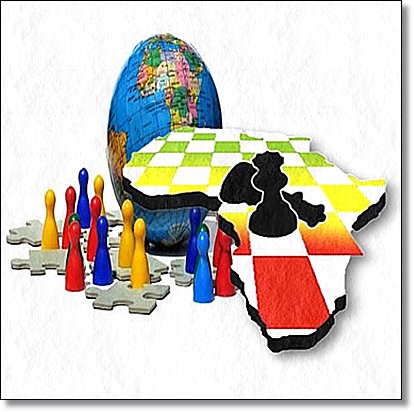Geopolitics: Why Africa Must Create Its Own Dream

 |
Cross pollination of ideas that accrue from interacting with different civilizations has contributed to successful economies. The case has not been different in Africa. The continent gained from its interaction with Europeans to craft its modern nation-states. The East Coast of Africa gained from its interaction with Arabs to craft the rich culture of over 300 million people that speak Kiswahili language. Africa should build on such gains to evolve a navigation system to manage the ever changing geopolitical landscape.
Persuaded with the continent’s potential to play a key role in economic progress and attracted by its abundant natural resources, vast arable land and potential market, key global powers are docking on its shores. The United States of America’s decision to host over 50 Africans heads of State is not accidental. China has been treating Africa as one entity after every 3 years and other players are joining the trend. The dilemma is in the historical pattern where Africans have not mastered the art of converting their relationship with other global partners into channels to meet continental core interests as the Europeans, Indians, Japanese and Chinese have done. Africans’ vision has been constrained by focus on day to day challenges as its main agenda when meeting external actors. To reap meaningful dividends from global relationships, Africa must put in place a strategy or galvanizing philosophy that clearly states its purpose for existence.
History offers templates that Africa can tweak for its on strategy. Arabs visited the East Coast of Africa armed with religion, Islam and the ‘Bao’ board game that offers wisdom on how to capture, secure and invest. The Europeans came to Africa armed with Christianity together with the Poker and Chess games. A poker winner is determined by the ranks, combination of their cards and what they are able to hide to the end of the game. Chess is a game of ‘checking’ a ‘mate’ and ‘capturing’ through long-term positioning and tactical maneuvers. After 600 years of Zheng Khe’s voyages, the Chinese are visiting Africa armed with the Confucius Philosophy and the ‘Wie Qi’ game.
If the earth would be flattened into a board game, one would likely notice Western and Eastern (mostly Chinese) games playing out with an inbuilt conscious and deliberate strategy while Africans play a reactive and peripheral role.
The recent launch of the New Development Bank by Brazil, Russia, India, China and South Africa (BRICS) to compete with the Bretton Woods Institutions (The International Monetary Fund and the World Bank) opens a new playing space in Africa. The unfolding world order is likely to witness stiff competition between the Washington Consensus vis-à-vis the Beijing Consensus. The Washington Consensus that promotes market driven economies, property rights and rule of law will face off in the African space with the emergence of the Beijing Consensus that entails state management of economies and self-determination. Both consensuses grow economic value chains within which Africa must position its business entities to participate. Africans must evolve systems that promote the growth of African businesses to compete globally and transform the continent’s resources into value.
Established actors wield the jungle type of cutthroat competition that enables them to use a variety of tools (aid, political values, security architecture and global market rules) to win both on their short and long term strategy. Tanzania’s Prof. Mwesiga Baregu, argues that the use of the “village” and “jungle” imageries has decisive implications for Africa’s choice of strategy. A village is a low risk space that is largely inclusive and caring. A jungle is a high risk space that is hostile and regulated by power as opposed to rules. External actors coming to Africa have successfully clothed their intentions on the global village mentality. Having surrendered the task of addressing the continent’s challenges to outsiders, the creative intellectual capabilities of Africans have been submerged.
To reverse the state of affairs, Africa, must domesticate processes used to identify its leaders. After over 50 years of independence, the leadership structure on the continent has largely spawned short term minded “gate keepers” that safeguard external interests. As an emerging continental monolith, Africa must establish an inclusive consensus driven style to pick leaders that can drive the regions’ interests.
The continent’s leaders’ quest to focus on productivity, food security, health, security and economic development should not exclude the urgent need to whip their own citizenry to drive such processes. A deliberate investment in Africa’s youthful population with long term goals is urgently required. Africa enjoys a demographic dividend estimated at 60% of the continent’s over 1 billion people aged below 25 years. It is foolhardy to expect the youth to drive the future of Africa without teaching them how to drive.
Africa should take courage and have a clear break from the past where tools such as aid have been used to cloud productivity on the continent. It should be clear to Africans that it has never been the lack of money that has sustained poverty on the continent, rather, the exclusionary policies crafted by dominant market players. An opportunity beckons in a multi-polar world for Africans to leverage on the appetite of external actors to push for the reform of the global financial and economic systems.
Africans cannot be said to be rising while they are riding on the dreams of established markets. The African people must craft their own dream. This can only happen by drawing lessons from centuries of interaction with other civilizations to evolve an African game of strategy. The purpose of such a game will be to provide navigation skills in the rough seas of multilateral engagement with global powers. It is important to cultivate the culture of ‘know-how’ and ‘know-why’ without which Africa’s continued partying with established markets will but sustain the continent in misery.
By James Shikwati
The author james@irenkenya.com is Founder Director of Inter Region Economic Network (IREN) and Publisher of the The African Executive online magazine.
